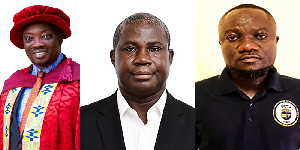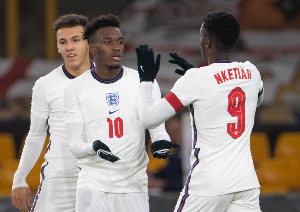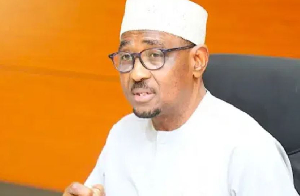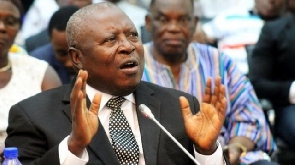Watching day two of the just-ended World Athletics Championships in Moscow in the company of other Ghanaians dismayed by our almost complete absence from the games, our thoughts turned to the nation’s steady decline in international athletics over the past two or three decades. Ghana athletics or lack thereof was subjected to the kind of thorough armchair forensic examination that is usually aided by alcoholic and non-alcoholic beverages of different types and strengths. It was in the midst of this vigorous discussion that a friend threw out this line that goes to the heart of the matter. He said: “The issue is simple – we can’t run, jump or throw”.
If we accept that statement as true it means we are a country of 24 million non-running, non-jumping, and non-throwing static people; or the only other interpretation is that we are not doing something right, and maybe not only in track and field. Let us look at the evidence (at least we are good at this): we have not always been such a static and lazy nation having produced some spectacular athletes in the past. Names such as Hannah Afriyie, Michael Ahey, Stanley Allotey, Alice Anum, Christiana Boateng, Rose Hart, Ohene Karikari, Hannah Afriyie, and many others are almost forgotten but should be emblazoned in gold. They once made Ghana the leading athletics country in Africa.
Today, the word “Ghana” is as rare at international sporting circles as snow on the Sahara, and our presence, if it can be described as such has tended to be token and routine. The situation is set to get even more embarrassing with the recent defection of the long jumper Ignatius Gaisah who together with Vida Anim, Margaret Simpson and Aziz Zakari have been the most notable carriers of the Black Star emblem at important meetings. Gaisah secured silver for the Netherlands in the long jump and Ghana has become a nation that leaks rather than absorbs athletes although unlike Kenya which regularly exports athletes to Qatar and other rich nations, we have not produced any athletics of great repute in the recent past. We were represented in Moscow by one athlete, a brave young woman named Janet Amponsah whose name is new to most Ghanaians.
Going back to where we started, surely among our population some can run, jump or throw; even some people may be capable of all three and more, but as with the nation itself, such talents remain in the column marked “potential” waiting for transition into the box marked “attained”.
One of the reasons for this sad fact is that as a nation we put very little premium on achievements outside a very narrow band of activities and professions. Today, it has become patently obvious that if you wish to make something extraordinary of yourself in Ghana your best bet is to become a politician, a preacher, or in sports a football player. Of course I selected these three groups because although they are highly lucrative their output is not immediately countable, and soccer falls into this category because unlike track and field sports, or even cricket and tennis, you can lose yourself in the team and not be personally accountable in terms of the result.
Therefore, football perhaps captures the essence of the Ghanaian zeitgeist and soul like no other sport. It is a sport in which no one is expected to excel all the time and in which failure is often explained and excused in a hundred different ways. It is not the most honest sport because fooling the referee and the opposition is seen as an essential part of the game; definitely no player is expected to pass a sleepless night for getting a penalty through diving in the box. The rewards at the highest level are stupendous, and for a nation constantly looking for miracles, those rewards are miraculous. Boys of average abilities become millionaires in two or three seasons in a way that no sport can match. It is also a very simple game to understand and play.
This is not the case with many other sports. For example, the physicality of rugby football and its elaborate technical demands make soccer games look like a tea party, and yet rugby players are nowhere near football players in terms of pay and perks. It is the same for cricket, a game in which every player must run, throw, jump and hit with precision over very long periods of time. Full international cricket matches, known as test cricket are played over five whole days! But before the coming of the Indian Premier League top international cricketers were paupers compared to football players.
All sports demand discipline, physical toughness, mental concentration and devotion but perhaps none comes close to the overall demands of track and field. I am reading The Dirtiest Race in History, a book anchored on the rivalry between Ben Johnson and Carl Lewis which culminated in the 100 metres final at the Seoul Olympics, but delves far deep into the world of track and field. This is a sport that demands 200 per cent devotion not just from the athletes but coaches, agents, administrators and even suppliers of illegal drugs! It is a world that closes off everything else. And yet until before he hit the real limelight Lewis was being paid a paltry US$400 to race in Europe. Carl Lewis started jumping and running before he was a teenager and as Usain Bolt recently explained, he has been a champion since age 15.
Do we lack the discipline and focus of Lewis and Bolt? Or perhaps we should we should look into the administration of the sport for answers. The Ghana Athletics Association was unable to send a team to the African Juniors Championships in Nigeria which was due to lack of funds. Recent public statements by the Association indicate that lack of funds could well be its middle name! The story of Janet Amponsah, the sole warrior in Moscow is revealing. Although she made her debut as an athlete in 2007 it was only recently that she won a scholarship to train in Mauritius. Mauritius is not a hotbed of athletics but this must count as progress.
The 20 year old the only Ghanaian runner at the games and understandably felt lonely. “This is not my first experience at any world event. I have experienced this a few times but I must admit that I am a little worried because if I had someone with me, I would feel better but there is nothing I can do about it. I just have to focus on the Games and get on with my work”.
Anyway, the decline in track and field sports in Ghana has many other causes. For example, our media hardly mentions any other sport apart from football. Indeed, perhaps 99 percent of all sports reports in the Ghana media are about that one sport with the one percent going to boxing. In many countries, most of the people described as sportswriters in Ghana would be given the correct designation of “football writers” so that the transparent lack of media for other sport would not be hidden under a misleading label. As far as I know, no media organisation in this country purposefully trains its journalists in reporting any other sport, and even the only exception – boxing, has not been well served since Sammy Okaitey of the Daily Graphic passed away a couple of years ago.
Football has a lot to answer for the lack of interest in other sport but we cannot blame the sport or its teeming supporters for Ghana’s one-sport nation status. Instead we have to blame the long list of politicians and administrators who have lacked the farsighted vision and energy of Ohene Djan, Kwame Nkrumah’s Director of Sports in the First Republic, who set out to find and nurture Ghanaians who could run, jump and throw. If we look for them we will find the grandchildren of that generation still bustling with potential for Ghana. Potential is not enough.
kgapenteng@gmail.com
kgapenteng.blogspot.com
Opinions of Tuesday, 20 August 2013
Columnist: Gyan-Apenteng, Kwasi














